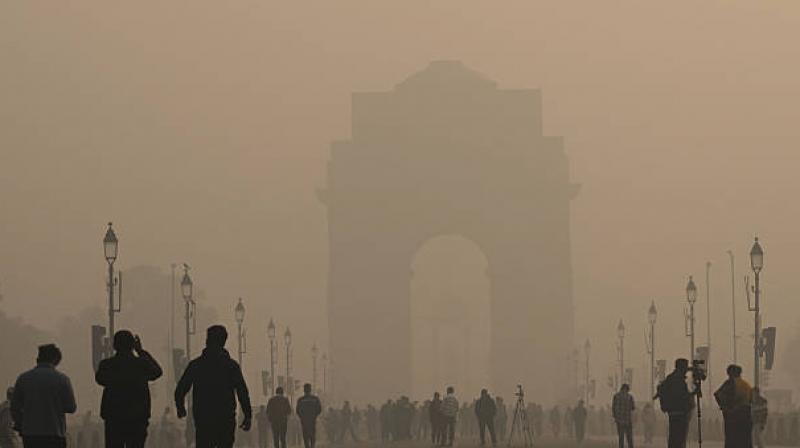
According to pollution tracking platform AQI.in, breathing air in Delhi is as harmful as smoking 7.8 cigarettes a day.
Delhi AQI Crosses 300 Today: Air Quality falls to "Very Poor" Category
According to Central Pollution Control Board (CPCB) real-time monitoring data, many stations had a reading over 300 this Monday morning. It is an alarming situation causing breathing issues for many, especially sensitive people with lung or heart diseases.
According to pollution tracking platform AQI.in, breathing air in Delhi is as harmful as smoking 7.8 cigarettes a day. The basis for this estimate is the average PM2.5 concentration over the past 24 hours. There has been a 7.3 per cent rise in pollution levels in Delhi as compared to last year. In November 2024, the average AQI reading was 285, compared to 306 this November.
The PM2.5 concentration on Monday was measured at 168 µg/m³, whereas the World Health Organization (WHO) limit is 15 µg/m³. The current PM2.5 level in New Delhi is 11.6 times above the recommended limit. According to World Health Organization guidelines, "This exposure to PM2.5 can cause diseases that can affect both the cardiovascular and respiratory systems, including lung cancer, stroke and chronic obstructive pulmonary disease (COPD)."
According to Decision Support System (DSS) analysis, the major contributors for Delhi's PM2.5 are:
- Transport (18.1%)
- Emissions from Jhajjar District (11.2%)
- Residential Sector (4.5%)
- Regional Sources outside Delhi (36.8%)
What is Air Quality Index (AQI) ?
Air Quality Index (AQI) is a system used by governmental bodies to know about air pollution and its impact on various parameters. According to Central Pollution Control Board (CPCB) air quality standards, these categories represent the severity of the situation:
- 0–50 (Good): Satisfactory air quality, and air pollution poses little or no risk.
- 51–100 (Satisfactory): Acceptable air quality. However, there may be minor challenges for people who are unusually sensitive to air pollution.
- 101–200 (Moderately Polluted): May create challenges for people with heart and lung issues.
- 201–300 (Poor): It may cause discomfort for people in general; sensitive people may experience more serious issues.
- 301–400 (Very Poor): High alert. Everyone may experience more serious health challenges.
- 401–500 (Severe): Severe health impact on sensitive people, but everyone is more likely to get affected.
Efforts of Delhi Government to mitigate air pollution:
- Truck-mounted water sprinklers and other dust control measures across several parts of the city.
- Ban on the entry of all BS-III and below standard commercial goods vehicles that are not registered in Delhi from November 1 as per The Commission for Air Quality Management (CAQM).
- An announcement by The New Delhi Municipal Council (NDMC) announced the doubling of parking fees across the national capital after the Graded Response Action Plan (GRAP) Stage II was invoked due to decreasing air quality. The decision, aimed at discouraging the use of private vehicles, will see parking charges double for off-road and indoor parking areas managed by the NDMC.
Sources:
1.SAFAR- https://share.google/LWhH7qj9EDwS43wTH
2.CPCB- https://share.google/inJ5U0UQLJAFm9PWi














